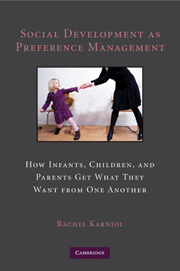Crossref Citations
This Book has been
cited by the following publications. This list is generated based on data provided by Crossref.
2010.
Books Received.
Current Anthropology,
Vol. 51,
Issue. 5,
p.
722.
Karniol, Rachel
Galili, Lior
Shtilerman, Dafna
Naim, Reut
Stern, Karin
Manjoch, Hadar
and
Silverman, Rotem
2011.
Why Superman Can Wait: Cognitive Self-Transformation in the Delay of Gratification Paradigm.
Journal of Clinical Child & Adolescent Psychology,
Vol. 40,
Issue. 2,
p.
307.
Karniol, Rachel
2012.
Storybook-Induced Arousal and Preschoolers' Empathic Understanding of Negative Affect in Self, Others, and Animals in Stories.
Journal of Research in Childhood Education,
Vol. 26,
Issue. 3,
p.
346.
Rosenbaum, Michael
and
Ronen, Tammie
2013.
Mental Well-Being.
p.
209.
MACWHINNEY, BRIAN
2014.
What we have learned.
Journal of Child Language,
Vol. 41,
Issue. S1,
p.
124.
MacWhinney, Brian
2015.
Handbook of Child Psychology and Developmental Science.
p.
1.
Giustinelli, Pamela
and
Manski, Charles F.
2018.
SURVEY MEASURES OF FAMILY DECISION PROCESSES FOR ECONOMETRIC ANALYSIS OF SCHOOLING DECISIONS.
Economic Inquiry,
Vol. 56,
Issue. 1,
p.
81.
Tavassoli, Nasim
Recchia, Holly
and
Ross, Hildy
2019.
Preschool Children’s Prosocial Responsiveness to Their Siblings’ Needs in Naturalistic Interactions: A Longitudinal Study.
Early Education and Development,
Vol. 30,
Issue. 6,
p.
724.
2020.
The Cambridge Handbook of the International Psychology of Women.
p.
137.
Karniol, Rachel
and
Čehajić-Clancy, Sabina
2020.
The Cambridge Handbook of the International Psychology of Women.
p.
221.
Nicolopoulou, Ageliki
and
Smith, Peter K.
2022.
The Wiley‐Blackwell Handbook of Childhood Social Development.
p.
538.





